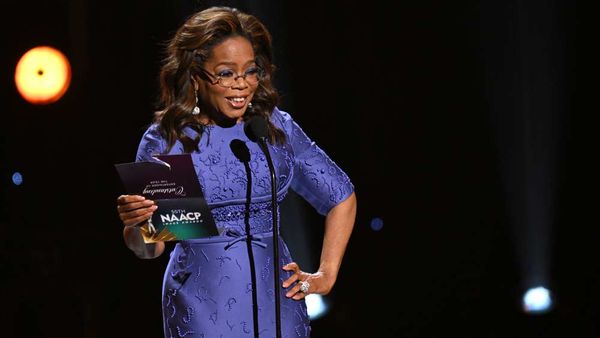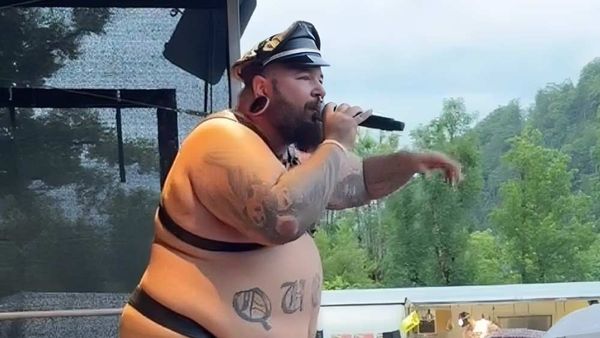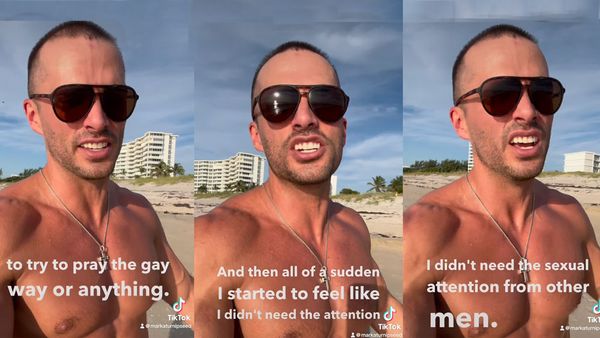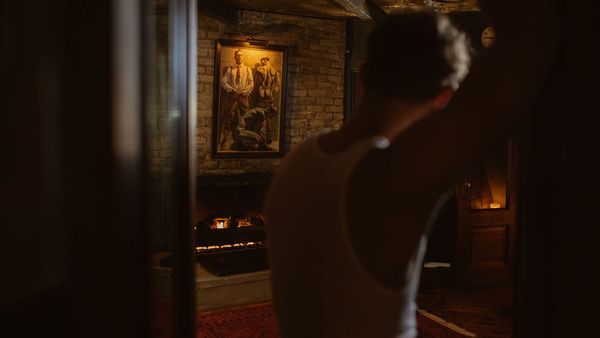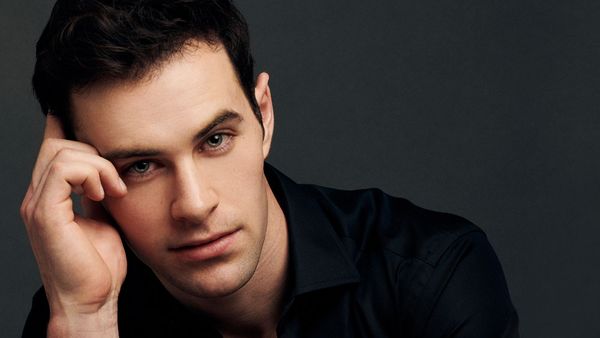March 8, 2010
'Just do it' -- director Gustavo Camelot on his first feature
David Andrusia READ TIME: 7 MIN.
Born in Montevideo in 1976, Gustavo Camelot studied architecture at Oxford, appeared on stage in the West End, and won awards for his first short film, The Seventh Bottle, leading to his first feature, Broken Glass, that has just been released on DVD in the United States.
Broken Glass (Vidrio Roto) follows, through seven bottles of "magical" wine, the journey of Valentina, a beautiful artist living in Berlin. With a sordid history of sexual and physical abuse, and having been caught in the arms of her female lover by her wealthy, overbearing mother, Val is forced to make a choice: to live a "normal" life, or be forever cut off --financially and emotionally. She concedes to her mother's ultimatum, and pursues a heterosexual relationship to appease her, only to catch her new boyfriend in bed with another man. Her inability to cope with her life triggers her repressed male alter-ego to emerge and take over.
Becoming a film director
EDGE: What precipitated your interest in directing films?
Gustavo Camelot: Back in 1996 I moved from Berlin to Barcelona. At the time I had a thriving career as an architect, even though I had always wanted to be an actor. In fact, at the age of 17 I had already successfully auditioned to enter the Comedia Nacional in Montevideo, but my father wanted me to have a "proper" university degree and imposed an ultimatum, very much like Valentina's mother in the film. In Barcelona, my best friend was a Catalan actress, and that prompted me to study drama. Two years later, after a couple of good roles on stage in Barcelona (most notably playing Leonardo in Lorca's Blood Wedding), I moved to London where I was the only, non-native English speaker to be accepted at Mountview, a conservatory for the performing arts in Crouch End. After finishing I managed to snatch some very good roles in the West End, like Father Hugh in Gaveston and Marius in Les Miserables (only for 2 weeks, as I was the understudy!), then I started with films: short ones to begin with, then features. Through a series of circumstances, I ended up in this Hollywood Acting Workshop; one thing led to the other and here I am.
EDGE: Where did you get your first idea for a film?
Gustavo Camelot: I had written a novel, Memories of an Ideal in Coma, based on my own "bad romance" in Berlin, and slowly turned it into a screenplay. At the time it was called Concrete and Broken Glass. The Los Angeles Film School got hold of that script and I was offered a place in the newest program they had: Feature Development Program. That gave birth to a short film, The Seventh Bottle, as a window into the world of the screenplay, and also gave birth to my new found role in life: the combination of my architectural composition and organizing skills and my acting story telling ones, through emotions, I became a director.
EDGE: Is that why you came to LA?
Gustavo Camelot: As I said, I came to LA due to chance--this scholarship led me from cold and dreary London to three weeks of acting-related workshops in Hollywood and living in what would soon become my obsession: Venice Beach. It just reminded me so much of my life in Montevideo; I grew up in a house in front of the ocean and this I had been missing for long 10 years while in Berlin, Paris, Barcelona or London. Now I could finally live by the ocean and utterly feel in love with VB!
Story continues on following page.
Watch the trailer for Broken Glass:
Exploring the ying and yang
EDGE: Was the short The Seventh Bottle done as a student film?
Gustavo Camelot: Yes, in a way. I ended up having my screenplay picked at The Los Angeles Film School, that lead me to the Feature Development Program and that, in turn, lead to the concretion of my first short film, The Seventh Bottle.
EDGE: Did you do the fest circuit?
Gustavo Camelot: Sure. The short film, The Seventh Bottle, won a couple of awards, notably Best Editing in the Beverly Hills International Film Festival and the Silver Remy Award in the Worldfest Houston Film Festival. It was also shown at the Silver Lake Film Festival, the Temecula International Film Festival, Uruguay International and NewFest in New York, among others.
EDGE: When did you shoot the feature film? How did you finance it?
Gustavo Camelot: The festival success of the short prompted me to raise some money and shoot (using the school connections) a 60-minute film, that compressed the story of the feature utilizing the story telling device of the 7 bottles, each one telling a story. That film, called VAL/Val, made it to Cannes in 2005, and there I got a sales agent that ended up encouraging me to complete the feature. So in 2006 I was shooting the rest of the feature and by 2007 I was re-editing the whole thing, creating a whole different story telling structure. Lack of funds, and the crisis of 2008, slowed down the post-production process tremendously, to the point that I only finished the online of the film in 2009 and got finally released now, in 2010.
EDGE: What's the thesis of the film?
Gustavo Camelot: In short: "fighting for what you believe in can not only break rules but your own persona."
EDGE: What are the films' themes, and what statements did you want to make?
Gustavo Camelot: Good question, because the themes of the film were always very present in the back of my mind and pretty much controlled all the decision making. The first and most important one is duality, the yin and the yang (an amulet I still wear!), the duality intrinsic in all of us: we males go to the extreme of being genetically dual, with a female X linked to our masculine Y in our very genes. I also wanted to touch the subject that true love has no gender, and that obsessive love is just due to societal disease of control or possess (pretty much distilled within ourselves through our all consuming societies) and that it also has no gender. I also wanted to explore the weight of religiousness in the decision making process of our lives and most importantly as a repressing, "emotion-castrating" tool (in this case, with the Catholic traditions), the resulting struggle with one's consciousness, and fighting for what one believes in, and that sort of thing.
EDGE: Do you consider this a gay film? And have there been any distribution problems because of the theme?
Gustavo Camelot: I am not sure how much this film can be categorized as a gay and lesbian one. The main character is gay, yes, but she is also a brunette or an artist. The film in not about her being gay but being ostracized because of being gay and having to struggle with her own psyches, her own phantoms (very much inherited from her grandfather). There is a stigma in our societies against gay people... before it was with women, or Jews, or blacks and now it is with gays. Having said that, because most people don't really see this as a gay film per say but as a psychological drama, I haven't yet encountered to many problems for its distribution.
EDGE: What is the distribution plan for the film?
Gustavo Camelot: The present distribution is mostly online, through Amazon, Blockbuster, and Best Buy. I even attempted the Venice Boardwalk for two days, putting a stand up... lots of fun!
EDGE: How are you marketing the film?
Gustavo Camelot: The distribution company, CVD, is marketing the film online. There's also a social network, which is: www.VidrioRoto-BrokenGlass.ning.com
EDGE: What is the subject of your new film and what is its status?
Gustavo Camelot: It's about the involvement of the U.S. government in the imposition of those fascist dictatorships that mined South America during the 60s, 70s and 80s. Basically, in an attempt to contain the advance of communism (this was the Cold War "fought" in South America), the US helped torture and murder hundreds of thousands-and up to four million, by some estimates--Latin Americans dissidents, mostly socialists and communists, even priests belonging to the "Theology of the Liberation."
The film is called The Tree of Red Stars, it has already been declared of National Interest by the Government of Uruguay, and its logline reads: "Life is not worth living without a cause worth dying for... is the maxim that guides the lives of four friends who come of age during their life and death struggle to prevent the take over of their country during the Cold War." and its website is: www.TheTreeofRedStars.com
EDGE: What advice (please, don't be bromidic!) do you have for other filmmakers in the early stages of their careers-both what to do and what to avoid?
Gustavo Camelot: The best advice I can give to anyone is what Nike says: "Just do it."
For more on Broken Glass, visit the or at the film's
Watch this clip of guerrilla marketing Broken Glass on Venice Beach in January, 2010.
David Andrusia writes on food, travel, style, and beauty. Author of the bestseller BRAND YOURSELF, he is a career consultant in Los Angeles. Visit him online at www.davidandrusia.com

